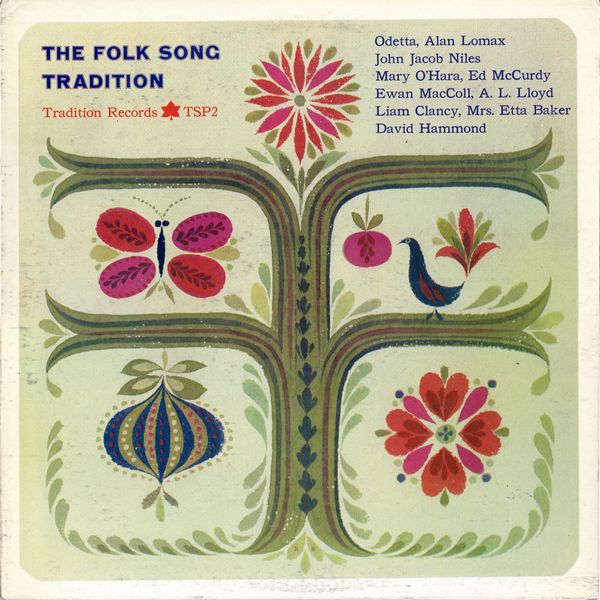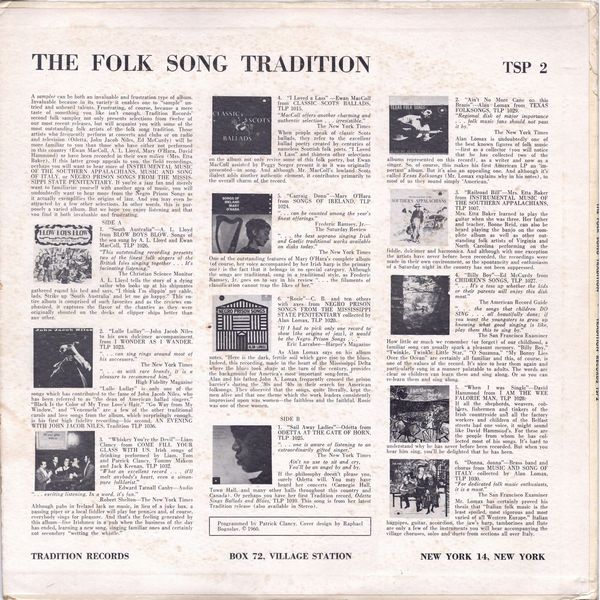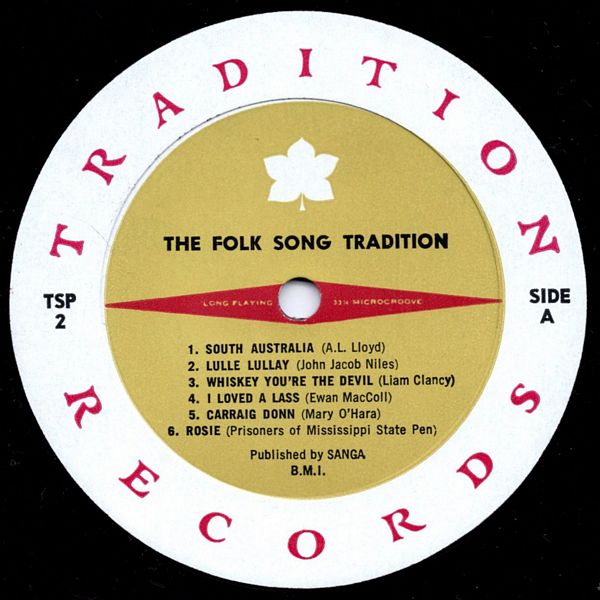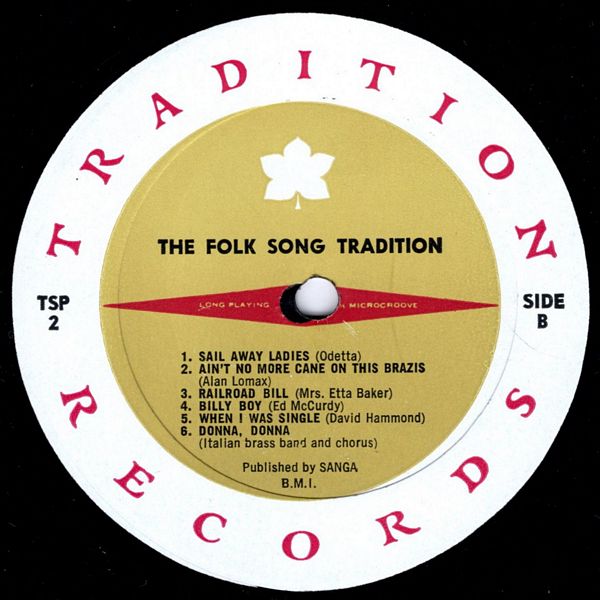

 |



|
Sleeve Notes
THE FOLK SONG TRADITION
A sampler can be both an invaluable and frustration type of album. Invaluable because in its variety it enables one to "sample" untried and unheard talents. Frustrating, of course, because a mere taste of something you like isn't enough. Tradition Records' second folk sampler not only presents selections from twelve of our most recent releases, but will acquaint you with some of the most outstanding folk artists of the folk song tradition. Those artists who frequently perform at concerts and clubs or on radio and television (Odetta, John Jacob Niles, Ed McCurdy) will be more familiar to you than those who have either not performed in this country (Ewan MacColl, A. L. Lloyd, Mary O'Hara, David Hammond) or have been recorded in their own milieu (Mrs. Etta Baker). If this latter group appeals to you. the field recordings, perhaps you will want to hear more of INSTRUMENTAL MUSIC OF THE SOUTHERN APPALACHIANS, MUSIC AND SONG OF ITALY, or NEGRO PRISON SONGS FROM THE MISSISSIPPI STATE PENITENTIARY. If you're a jazz fan and merely want to familiarize yourself with another area of music, you will undoubtedly want to hear more from the Negro Prison Songs as it actually exemplifies the origins of jazz. And you may even be attracted by a few other selections. In other words, this is purposely a varied album. But we hope you enjoy listening and that you find it both invaluable and frustrating.
"South Australia"—A. L. Lloyd from BLOW BOYS BLOW. Songs of the sea sung by A. L. Lloyd and Ewan MacColl, TLP 1026.
"This outstanding recording presents two of the finest folk singers of the British Isles singing together … It's fascinating listening." The Christian Science Monitor.
A. L. Lloyd tells the story of a dying sailor who looks up at his shipmates gathered round his bed and says, "I think I'm slippin' my cable, lads. Strike up 'South Australia' and let me go happy." This entire album is comprised of such favorites and as the reviews emphasized, it captures the flavor of the chanties as they were originally shouted on the decks of clipper ships better than any other.
"Lulle Lullay"—John Jacob Niles to his own dulcimer accompaniment from I WONDER AS I WANDER, TLP 1023.
" … can sing rings around most of his successors." The New York Times
" … as with rare brandy, it is a pleasure to recommend him." High Fidelity Magazine
"Lulle Lullay" is only one of the songs which has contributed to the fame of John Jacob Niles, who has been referred to as "the dean of American ballad singers." "Black Is the Color of My True Love's Hair," "Go Way from My Window," and "Venezuela" are a few of the other traditional carols and love songs from the album, which surprisingly enough, is his first high fidelity recording—his second, AN EVENING WITH JOHN JACOB NILES, Tradition TLP 1036.
"Whiskey You're the Devil"—Liam Clancy from COME FILL YOUR GLASS WITH US. Irish songs of drinking performed by Liam, Tom and Patrick Clancy, Tommy Makem and Jack Keenan, TLP 1032.
"What an excellent record … it'll melt anybody's heart, even a simon-pure folklorist." Edward Tatnall Canby—Audio
" … exciting listening. In a word, it's fun." Robert Shelton—The New York Times
Although pubs in Ireland lack no music, in lieu of a juke box, a passing piper or a local fiddler will play for pennies and, of course, everybody sings for pleasure. And that's the feeling generated by this album—five Irishmen in a pub when the business of the day has ended, learning a new song, singing familiar ones and certainly not secondary "wetting the whistle."
"I Loved a Lass"—Ewan MacColl from CLASSIC SCOTS BALLADS, TLP 1015.
"MacColl offers another charming and authentic selection … irresistible."—The New York Times
When people speak of classic Scots ballads, they refer to the excellent ballad poetry created by centuries of nameless Scottish folk poets. "I Loved A Lass" and thirteen other selections on the album not only revive some of this folk poetry, but Ewan MacColl assisted by Peggy Seeger present it as it was origmally presented—in song. And although Mr. MacColl's lowland Scots dialect adds another authentic element, it contributes primarily to the overall charm of the record.
"Carraig Donn"—Mary O'Hara from SONGS OF IRELAND, TLP 1024.
" … can be counted among the year's finest offerings." Frederic Ramsey, Jr.—The Saturday Review
" … the best soprano singing Irisht and Gaelic traditional works available on disks today." The New York Times
One of the outstanding features of Mary O'Hara's complete album (of course, her voice accompanied by her Irish harp is the primary one) is the fact that it belongs in no special category. Although the songs are traditional, sung in a traditional style, as Frederic Ramsey, Jr. goes on to say in his review " … the filaments of classification cannot trap the likes of her."
"Rosie"—C. B. and ten others with axes from NEGRO PRISON SONGS FROM THE MISSISSIPPI STATE PENITENTIARY collected by Alan Lomax, TLP 1020.
"If I had to pick only one record to show [the origins of jazz], it would be the Negro Prison Songs … " Eric Larrabee—Harper's Magazine
As Alan Lomax says on his album notes. "Here is the dark, fertile soil which gave rise to the braes. Indeed, this recording, made in the heart of the Mississippi Delta where the blues took shape at the turn of the century, provides the background for America's most important song-form."
Alan and his father John A. Lomax frequently crossed the prison barrier's during the '30s and '40s in their search for American folksongs. They observed that the songs, quite literally, kept the men alive and that one theme which the work leaders consistently improvised upon was women-the faithless and the faithful. Rosie was one of these women.
"Sail Away Ladies"—Odetta fron ODETTA AT THE GATE OF HORN, TLP 1025.
" … one is aware of listening to am extraordinarily gifted singer." The New York Times
Ain't no use to sit and cry. You'll be an angel by and by. If the philosophy doesn't please yoa. surely Odetta will. You may hare heard her concerts (Carnegie Hall, Town Hall, and many other halls throughout this country and Canada). Or perhaps you have her first Tradition record. Odetta Sings Ballads and Blues, TLP 1010. This song is from her latest Tradition release (also available in Stereo).
"Ain't No More Cane on this Brazis"—Alan Lomax from TEXAS FOLKSONGS, TLP 1029.
"Regional disk of major importance … folk music fans should not pass it by." The New York Times
Alan Lomax is undoubtedly one of the best known figures of folk music -first as a collector (you will notice that he has collected two of the albums represented on this record), as a writer and now as. a singer. So, of course, this makes his first American LP an 'important' album. But it's also an appealing one. And although it's called Texas Folksongs (Mr. Lomax explains why in his notes), to most of us they sound simply 'American.'
"Railroad Bill"—Mrs. Etta Baker from INSTRUMENTAL MUSIC OF THE SOUTHERN APPALACHIANS, TLP 1007.
Mrs. Etta Baker learned to play the guitar when she was three. Her father and teacher, Boone Reid, can also be heard playing the banjo on the complete album as well as other outstanding folk artists of Virginia and North Carolina performing on the fiddle, dulcimer and harmonica. And although with one exception the artists have never before been recorded, the recordings were made in their own environment, so the spontaneity and enthusiasm of a Saturday night in the country has not been suppressed.
"Billy Boy"—Ed McCurdy from CHILDREN'S SONGS, TLP 1027.
" … It's a toss up whether the kids or their parents will enjoy this disk most." The American Record Guide
" … the songs that children DO SING … all beautifully done; if you. want the youngsters to grow up knowing what good singing is like, play them this to sing by." The San Francisco Examiner
How little or much we remember (or forget) of our childhood, a familiar song can usually spark a pleasant memory. "Billy Boy," "Twinkle, Twinkle Little Star," "O Suzanna," "My Bonny Lies Over the Ocean" are certainly all familiar and this, of course, is one of the values of the record. It's nice to hear them again and particularly sung in a manner palatable to adults. The words are clear so children can learn them and sing along. Or so you can re-learn them and sing along.
"When I was Single"—David Hammond from I AM THE WEE FALORIE MAN, TLP 1028.
If all the shepherds, weavers, cobblers, fishermen and tinkers of the Irish countryside an3 all the factory workers and children of the Belfast streets had one voice, it might sound like David Hammond's. For these are the people from whom he has collected most of his songs. It's hard to understand why he has never before been recorded. But when you hear him sing, you'll be delighted that he has been.
"Donna, donna"—Brass band and chorus from MUSIC AND SONG OF ITALY collected by Alan Lomax, TLP 1030.
"For dedicated folk music enthusiasts, it is a must." The San Francisco Examiner
Mr. Lomax has certainly proved his thesis that "Italian folk music is the least spoiled, most vigorous and most varied oi a1! Western Europe." Italian bagpipes, guitar, accordion, the iaw's harp, tamborines and flute are only a few of the instruments you will hear accompanying the village choruses, solos and duets from sections all over Italy.